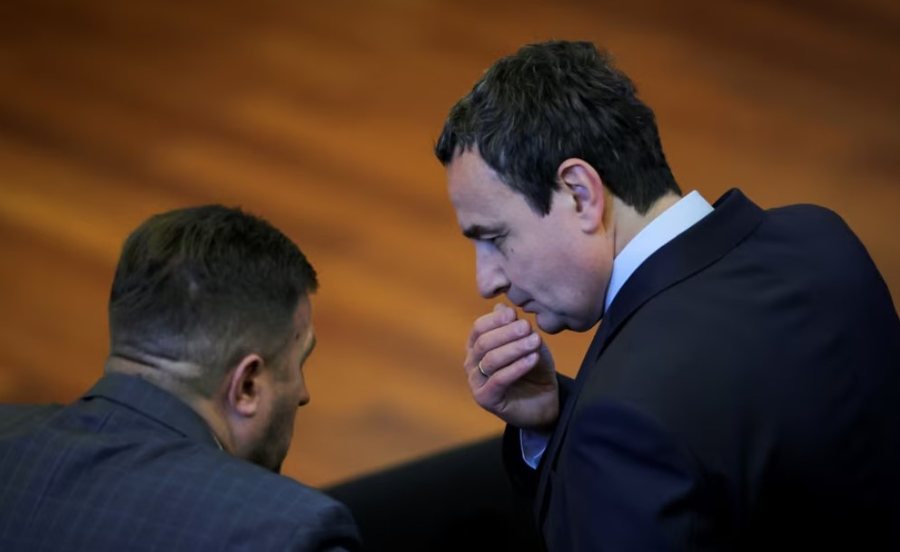
Early parliamentary elections are being mentioned as an opportunity to break the institutional blockade in Kosovo, but not everyone believes that they would bring any major change in the balance of political forces.
"All that can happen is a rough result and a return to the situation we are in currently. It is just an attempt to delay the solution," Artan Muhaxhiri, a sociologist and expert on political developments, tells Radio Free Europe.
Regular parliamentary elections in Kosovo were held on February 9.
Dozens of attempts to constitute the Assembly yielded no results.
Albulena Haxhiu from the Vetëvendosje Movement, who is failing to secure the votes to be elected speaker of parliament, floated the idea of holding extraordinary parliamentary elections, along with local elections, later this year.
Albert Krasniqi, from the non-governmental organization Demokraci Plus (D+), estimates that elections may be the only way out, if there is no compromise on the constitution of the Assembly.
However, he does not expect them to bring major changes in party representation in the Assembly.
"In terms of numbers, there may be movement, which may strengthen or weaken political parties, but, of course, there cannot be major changes in such a short time," Krasniqi tells Radio Free Europe.
Opposition doubts the effect of new elections
If for the Vetevendosje Movement - which came first in the February 9 elections, but not with enough votes to form a government alone - new elections are a solution, for most of the opposition, they will not fundamentally change the situation.
Democratic Party of Kosovo MP Abelard Tahiri says that if new elections are held, they should not be held together with local elections.
"...why wait for the local elections, which fall sometime in mid-October? We need to go much earlier," says Tahiri.
For the Democratic League of Kosovo, new elections would not solve anything.
The MP and deputy leader of this party, Lutfi Haziri, tells Radio Free Europe that they would simply be a "repeat of the February 9 elections," in terms of the results that would emerge from them.
"For the LDK, the elections are now unacceptable. I don't believe they solve anything, except that they can improve the vocabulary of the first party [LVV], because in the [past] electoral process there was a negative campaign, denigrating vocabulary - which has become a problem," says Haziri.
He adds that even if Vetëvendosje improves its vocabulary towards other parties, this will most likely not change LDK's stance on cooperating with it.
But he does not rule out the possibility of some cooperation in the future, if circumstances, as he puts it, become more favorable.
The vocabulary that was used should no longer be used, says Bekë Berisha, MP for the Alliance for the Future of Kosovo, emphasizing that this is essential to overcome the political crisis that is pushing towards early elections.
“[The elections] would not change anything [in the parties' results]. But it would be best if we understood - all political parties and political party actors - that we must stop the hostility... We have left no room to sit down or talk,” Berisha told Radio Free Europe.
Both during the campaign for the February 9 elections and afterwards, derogatory language was used by several political representatives - including the acting Prime Minister of Kosovo and leader of Vetëvendosje, Albin Kurti, and the leader of AAK, Ramush Haradinaj.
Restrained language as a chance for cooperation
Political experts estimate that, if the country goes to elections, one of the few benefits could be precisely the purification of this discourse.
Muhaxhiri says that the current vocabulary between political parties is increasingly distancing them from the possibility of cooperation.
"There is no point in this language getting so harsh, if behind the scenes they are talking about a coalition. However, in Kosovar politics, you never know," says Muhaxhiri.
Krasniqi is also in the same line. He says that divisive language has become a serious obstacle to building any kind of post-election cooperation.
The new elections could be accompanied by more restrained political rhetoric and, in this way, pave the way for a resumption of relations between parties, according to him.
"I believe that the parties, with [early] elections, are more willing to give a chance to the possibility of cooperation. They have understood that, with the current results, a single party cannot form [the government]. They definitely need to have a broader compromise," says Krasniqi.
Both analysts recall that without a compromise agreement that would lead to the constitution and then dissolution of the Assembly, early parliamentary elections are impossible to legally hold. /REL (A2 Televizion)











